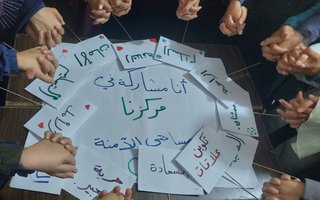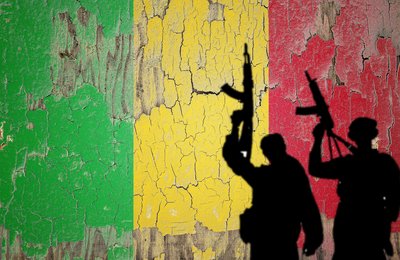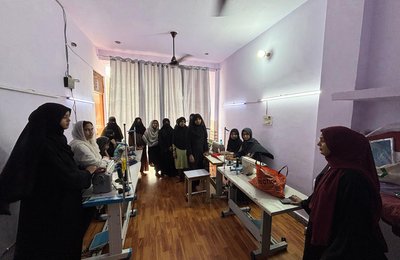When silence echoes louder: How the US aid freeze threatens Syria’s fight for justice

It began not with an explosion, but with silence. The silence was so heavy it crushed hope.
In early 2025, the US government announced a sudden freeze on aid allocated to Syrian civil society groups. For most of the world, it was a line in a policy memo. For Batoul and her colleagues at Women Now for Development (WND), it was a seismic rupture - a blow that brought a crucial justice programme to a screeching halt.
Batoul is responsible for WND’s Justice and Accountability Program, a vital initiative supporting families and organisations working to uncover the fates of Syria’s forcibly disappeared. Since 2012 WND has stood as a lifeline for over six grassroots groups and countless families, providing them with training, psychosocial support, advocacy tools, and resources to generate research and policy recommendations. One such policy advocated for a gender-sensitive approach to justice and mental health integration, a recommendation that made its way to an impartial institution for missing people.
Then came the silence. With the stroke of a pen in Washington, the lifeline was cut.
The consequences were swift and painful. Families already on the brink of collapse due to years of uncertainty were left without the psychosocial services they desperately needed. Advocacy groups who had worked tirelessly to document human rights violations and push for justice were immobilised. And perhaps most devastatingly, hope began to dwindle.
The human cost of funding cuts
When funding vanishes, it’s not just budgets that suffer. It’s people.
WND had been the sole funder for several Syrian civil society groups. With their support gone, many face imminent shutdown. These are not faceless NGOs, they are community-based organizations led by survivors, activists, and grieving family members. Their work includes Capacity Strengthening, Psychosocial Support (PSS), Advocacy Efforts, and Knowledge Production.
Losing them would be catastrophic. As Batoul notes, “WND is now channelling available, albeit limited, funds to respond to the immediate humanitarian crisis faced by these newly devastated families and groups through PSS and cash assistance , even if it means diverting from original strategic priorities. This highlights the constant, evolving demands on the ground despite reduced resources. Current "alternatives" largely involve unsustainable internal fund diversion, emergency appeals, and leveraging existing networks for shared resources.”
Once closed, it is difficult for these organisations to restart. Years of hard-earned institutional memory and local knowledge vanish. Activists, often at risk themselves, may flee or give up altogether. The people they serve become even more vulnerable, losing not just services but the sense that anybody cares.
The fallout for families
To understand the gravity of the crisis, consider groups like the Caesar Families Association and the Families for Freedom movement. They represent families who have endured the unthinkable: sons and daughters snatched in the night, fathers who disappeared into prisons, sisters who never returned.
For these families, the work of grassroots justice groups is vital.
“The interruption of work by organisations like the Caesar Families Association carries profound personal and collective consequences for the families of the disappeared,” Batoul says. “It deepens their trauma. It extinguishes the little hope they still hold.”
The ramifications are both personal and collective. Without these groups, critical evidence goes uncollected. Testimonies remain unheard. Global advocacy efforts lose their most credible voices. And the broader justice process for Syria - already hanging by a thread - threatens to collapse entirely.
A feminist movement in peril
Since the 2011 uprising, Syria’s feminist movement has grown against all odds. Women-led organisations like WND have created space for inclusive peacebuilding, gender justice, and protection for women and girls in some of the most hostile conditions imaginable.
Now, that progress teeters on the edge.
“Funding cuts don’t just interrupt projects - they dismantle movements,” says Batoul. Feminist organisations are often the only support networks for displaced women, survivors of sexual violence, and girls at risk. If they disappear, so do the protections they provide. “At such a critical moment in the history of Syria, the collapse of funding poses an existential threat to the broader Syrian civil society and the vibrant feminist movement established since 2011.”
And it’s not just about services. It’s about voices - the hard-won right for Syrian women to shape their own future. Without funding, those voices are drowned out, and a male-dominated narrative returns to the forefront of Syrian politics and post-conflict planning.
The loss is not only organisational, it’s ideological.
No clear alternatives, only improvisation
Despite the devastation, WND continues to respond. As the Assad regime collapsed, new evidence of torture and disappearance began to surface. New displacements have occurred. Families who had long hoped to learn the fate of their loved ones now received confirmation of their deaths in prison.
In the face of this, WND has had to divert limited funds from other programs to address these urgent needs.
Batoul explains, “We’re relying on internal reserves, emergency appeals, and solidarity networks. But this is not a solution. It’s a stopgap.”
Finding new donors has proven difficult. The scale and abruptness of the US aid freeze left little time for contingency planning. Many international partners face their own financial constraints. And yet the needs on the ground only grow more urgent.
A message to the international community
So, what does Batoul want the world to hear?
Her message is direct, unwavering, and charged with moral clarity:
“Do not abandon Syria now. Your support is not just financial—it is an affirmation that justice matters, that truth matters, and that Syrian lives matter.”
She continues, “Justice delayed is justice denied”. The longer these groups remain unfunded, the harder it becomes to achieve accountability. While the humanitarian crisis will deepen, vulnerable populations will be left without the support they rely on, and we risk losing the very seeds of peace. True reconciliation cannot happen without justice and the rule of law, and you risk betraying your own values. Human rights, dignity, and democracy cannot be conditional or temporary.
There is still time to act. Restoring funding isn’t just about saving programs, it’s about preserving the fragile architecture of a just future. A future where the disappeared are no longer just statistics. A future where survivors find healing. A future built not on silence, but on truth.
Because in Syria, as Batoul reminds us, silence is not neutral.
Silence, in the face of injustice, is complicity.
She concludes: “Do not let hope die.”
With gratitude to Batoul and Women Now for Development for their tireless work in the pursuit of justice, and for continuing to speak when others fall silent.
Caesar Families Association
https://www.caesarfamilies.org/
Families for Freedom
https://syrianfamilies.org/en/
Release Me
Ta'afi Group
Massar Families Group
Synergy Association for Victims






